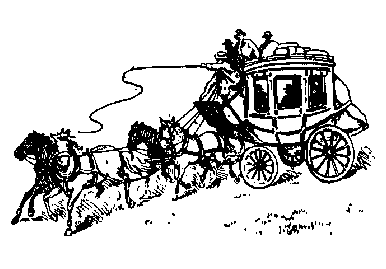Claim: An 1877 list of "tips for stagecoach travelers" is genuine.
Example:
The best seat inside a stage is the one next to the driver. Even if you have a tendency to seasickness when riding backwards — you'll get over it and will get less jolts and jostling. Don't let "sly elph" trade you his mid-seat. In cold weather, don't ride with tight-fitting shoes, or gloves. When the driver asks you to get off and walk, do so without grumbling, he won't request it unless absolutely necessary. If the team runs away — sit still and take your chances. If you jump, nine out of ten times you will get hurt. In very cold weather, abstain entirely from liquor when on the road, because you will freeze twice as quickly when under its influence. Don't growl at the food received at the station — stage companies generally provide the best they can get. Don't keep the stage waiting. Don't smoke a strong pipe inside the coach. Spit on the leeward side. If you have anything to drink in a bottle, pass it around. Procure your stimulants before starting, as "ranch" (stage depot) whisky is not "nectar." Don't lean or lop over neighbors when sleeping. Take small change to pay expenses. Never shoot on the road, as the noise might frighten the horses. Don't discuss politics or religion. Don't point out where murders have been committed, especially if there are women passengers. Don't lag at the wash basin. Don't grease your hair, because travel is dusty. Don't imagine for a moment that you are going on a picnic. Expect annoyances, discomfort, and some hardships. |
Origins: I first encountered this piece in a

museum adjacent to Sutter's Mill in Northern California, and it seems to be a popular item wherever stagecoaches are on display. Since every other item of this ilk — lists of rules or tips that reinforce historical stereotypes and highlight the similarities (or differences) of daily life in earlier eras — we've come across so far has been either provably apocryphal or not demonstrably genuine, I'm naturally skeptical of this one's validity as well. The list is frequently attributed to something which appeared in 1877 in the "Omaha Herald" (now the Omaha
So, we're left with a document that combines typical Old West stereotypes (hard-drinking, gun-toting, tobacco-spitting men to whom arduous travel, runaway horses, and even murder are unremarkable) with complaints identical to those of modern day airline travelers (cramped seating, bad food, and rude, bothersome passengers). Is it the real thing, or a latter day fabrication? We can't say for sure, but the last two entries give us pause, because in the 1870s there were exactly three ways to travel overland — walking, riding beasts of burden, and traveling via railroad — and all of them were (to varying degrees) dirty, uncomfortable and annoying modes of travel involving their fair share of hardships. To whom would this have been news in 1872?
Last updated: 11 July 2007
 Sources:
Sources:
